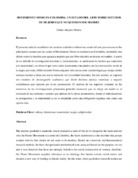Mostrar el registro sencillo del ítem
Movimiento nomo en Colombia: un estado del arte sobre estudios de mujeres que no quieren ser madres
| dc.contributor.advisor | XX | |
| dc.creator | Muñoz, Gloria Amparo | |
| dc.date.accessioned | 2021-10-04T20:48:49Z | |
| dc.date.available | 2021-10-04T20:48:49Z | |
| dc.date.created | 2020 | |
| dc.identifier.uri | http://hdl.handle.net/20.500.12237/2162 | |
| dc.description | El presente artículo académico de carácter cualitativo elaboró un estado del arte para reconocer las principales razones por las cuales el Movimiento Nomo es tendencia en Colombia, entendido este último como la doctrina que agrupa a mujeres que por libre elección no desean ser madres. A partir de un método de investigación heurístico y hermenéutico, se analizaron los hechos que anteceden a la maternidad y se observó que estos están fuertemente vinculados con la construcción social de la mujer, por ende, el Movimiento Nomo adquiere relevancia como una ideología que rompe ciertas normas sociales y dicta una nueva forma de ver la realidad femenina. En este sentido, se exponen tres estudios de investigación cualitativa que desde distintas ópticas examinan a mujeres colombianas que optaron por la no procreación. El análisis de los aspectos comunes en las narrativas de las investigaciones planteadas permitió reconocer que no elegir ser madre es el resultado de las corrientes sociales que priman en la época posmoderna, donde el individualismo es protagonista y la maternidad ya no es entendida como una obligación orgánica sino como una opción más. | spa |
| dc.description.abstract | The present qualitative academic article prepared a state of the art to recognize the main reasons why the Nomo Movement is a trend in Colombia, the latter understood as the doctrine that groups women who by free choice do not want to be mothers. Based on a heuristic and hermeneutical research method, the facts that preceded motherhood were analyzed based on the purpose set out and it was observed that these are strongly linked to the social construction of women, therefore, the Nomo Movement acquires relevance as an ideology that breaks certain social norms and dictates a new way of looking at female reality. In this sense, three qualitative research studies are presented that from different perspectives examine Colombian women who opted for non-procreation. The analysis of the common aspects in the narratives of the research proposed allowed us to recognize that not choosing to be a mother is the result of the social currents that prevail in the postmodern era, where individualism is the protagonist and motherhood is no longer understood as an organic obligation. but as one more option. | spa |
| dc.format.mimetype | application/pdf | spa |
| dc.subject | Feminismo | spa |
| dc.title | Movimiento nomo en Colombia: un estado del arte sobre estudios de mujeres que no quieren ser madres | spa |
| dc.subject.subjectenglish | Feminism | spa |
| dc.rights.accessRights | info:eu-repo/semantics/openAccess | spa |
| dc.creator.degree | Trabajadora social | spa |
Ficheros en el ítem
Este ítem aparece en la(s) siguiente(s) colección(ones)
-
Trabajo social [101]

